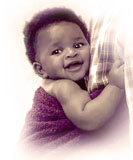
|
WABA Position on HIV and Breastfeeding
To : UNAIDS
UNICEF
WHO
From : Beth Styer
Co-chairperson
WABA
The World Alliance for Breastfeeding Action (WABA), is a conglomerate network, consisting of large networks, small networks, interested individuals and organizations. WABA is committed to the promotion, protection and support of breastfeeding and to the goals of the INNOCENTI Declaration.
As a member of the WABA steering committee and a member of WABA from its inception, I have been privileged to watch the growth of WABA and the World Breastfeeding Week campaigns. The challenge for WABA is to stay true to its grassroots responsibilities and to use both the state-of-the-art electronic media and also, hand, foot, grapevine or pigeons to send the word so that breastfeeding is protected and promoted for all mothers and babies.
The issue of HIV and Breastfeeding has challenged the breastfeeding community to deal with a difficult issue in the most positive manner possible. In response to the draft guidelines and papers that were presented in Geneva this past April, the Steering Committee of WABA wrote the enclosed statement.
In brief, the WABA Steering Committee is concerned that the full economic and health consequences of the recent WHO/UNAIDS/UNICEF policy on HIV and infant feeding have not been adequately analysed. We are most concerned that extreme caution be shown in the involvement of commercial firms that have direct economic interests in the outcome of these policies. And that existing and forthcoming data on the transmission of HIV through breastmilk needs to be reviewed by an independent panel.
We thank you for your ongoing support of breastfeeding and your commitment to breastfeeding as the best possible way to feed infants.
Thank you for your attention to this statement and we encourage ongoing dialogue with WABA on this issue. May you each find a way to celebrate World Breastfeeding Week 1-7 Aug, 1998
WABA Position on HIV and Breastfeeding
While mother-to-child transmission of HIV occurs, including through breastfeeding, the actual mechanisms of transmission are not well known. A minority of infants being breastfed by HIV positive mothers become infected. The actual rates of transmission are influenced by many factors, some known and some unknown.
WABA recognizes that every mother has a right to know her HIV status, and to be fully informed about the risks of alternative infant feeding choices.
WABA is concerned about what appears to be recent changes in the WHO, UNICEF and UNAIDS policy regarding breastfeeding and HIV. We are especially concerned that these changes appear to put major stress on the use of infant formula and less on alternative feeding methods.
We are concerned that the negative consequences on infant health of large-scale use of infant formula substitutes from birth onwards may be much worse than previously understood.
WABA recommends:
- that adequate resources, action and research be applied to alternatives such as modified breastfeeding, heat treated human milk, wet nursing, modified animal milks or home made formulas,
- avoidance of commercial exploitation in the use of replacement feeding, and that only generically labelled infant formula should be permitted,
- that the risk of feeding exclusively with breast-milk substitutes be very carefully evaluated, including effects on maternal fertility, infant morbidity and mortality, and the economic and social costs,
- that health workers who live with the problems of counseling mothers with HIV/AIDS should be heard, continuously involved, and provided with resources to study and follow up on their problems, and
- that existing and forthcoming data on the transmission of HIV through breast-milk be properly reviewed by an independent panel, before public health policy is further developed.
WABA and other NGOs should be involved in further analysis and planning of such public policies. Extreme caution must be shown in involving the commercial firms that have direct economic interests in the outcome of such policy deliberations.
WABA Steering Committee, Quezon City, Philippines, 9 June 1998
The World Alliance for Breastfeeding Action (WABA) is a global people's initiative to protect, promote and support breastfeeding. WABA works in close liaison with the United Nations Children's Fund (UNICEF). For further information, please contact: WABA, PO Box 1200, 10850 Penang, Malaysia Tel: (604) 658 4816 Fax: (604) 657 2655 Email: waba@waba.org.my Website: waba
WABA Homepage | Top
What is WABA | WABA Activities | WABA Documents | Special Pages
By Denise Arcoverde
|




